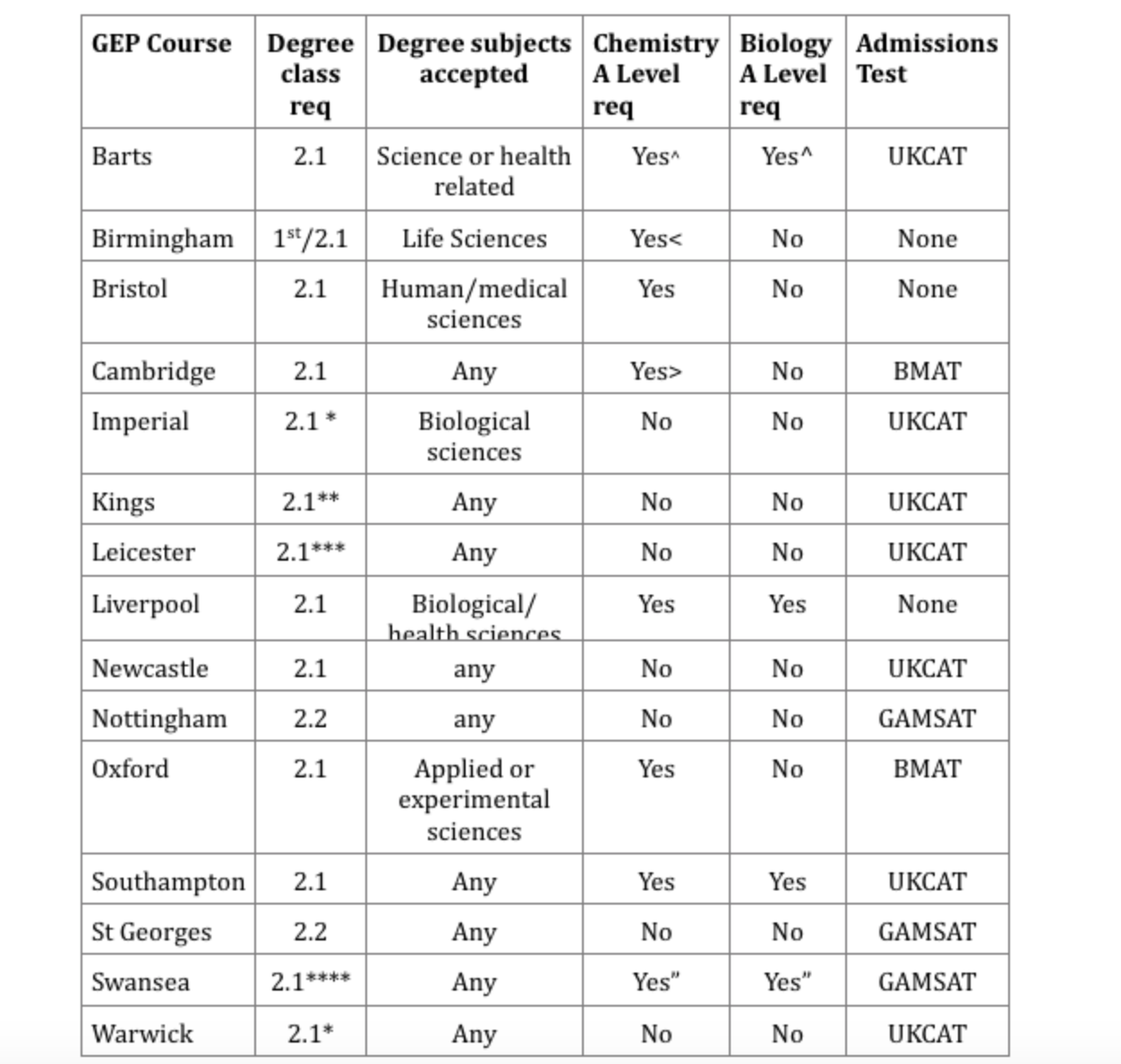Medicine: Graduate Entry Programme (GEP)
Are you a Graduate interested in now studying medicine?
Application
You apply in the usual way through UCAS, the deadline being October 15th. You have 4 choices of medical school. There are 15 that offer the GEP. You can apply for a 4-year graduate conversion course (GEP), an undergraduate 5 or 6 year course or a 5 year foundation/pre clinical course, for those graduates who do not have the entry requirements.
Entry Requirements
There is no official age limit, although your age will be taken into account in terms of how long you will be able to practice as a doctor once you have trained. There is a further 5-8 years training once you have completed medical school.
Most medical school graduate entry programmes require a 2.1 degree (with the exception of Nottingham and St Georges). Others actually require you to have your grades at the time of application – rather than just predicted. So check on the individual university websites. Others value postgraduate qualifications – a PhD will hold more value than a masters.
If you have a science degree and have achieved a 2.1, you will qualify for the 4 year accelerated conversion course offered by a number of universities (see list below). If you do not have a science degree, or a 2.1 or chemistry or biology at A Level, you may be limited as to where you can apply.
The table below provides a summary of entry criteria for each medical school:

* or 2.2 with phD
** or 2.2 with masters with merit
*** plus 1 years relevant post graduate full time work experience
****or 2.2 with masters
^ If chemistry and Biology are not a significant part of your degree
< If Chemistry is not a significant part of your degree
> Plus A-level/AS-level in at least 2 from Physics, Biology, Maths
“ Desirable not essential


Which Medical School?
Obviously you need to study the entry requirements of each school. Depending on your perceived ability in online tests, you may consider selecting one of the three that does not require these tests. You may also be interested in which are the more popular and which schools have less applications, so you can perhaps select a less subscribed school as one of your 4 choices. The most competitive schools are in this order:
- Kings College
- Newcastle
- Southampton
- Bristol
- Barts
- Liverpool
- Imperial College
- Oxford
- Birmingham
- Cambridge
- Nottingham
- Warwick
- St Georges
- Swansea
- Leicester
Kings for example has 53 applicants for each place, whereas Leicester has 9. Be aware however that these statistics are a snapshot of one year and they can change.
All medical schools will interview. Not all publish the statistics of the % of applicants interviewed. For those that do, this varies widely. For example Swansea, St Georges and Barts interview 31%, 29% and 22% of applicants respectively, yet Kings College interviews just 10%, Newcastle 11% and Bristol 15%.
Foundation or Pre-Clinical Year
If you are a graduate, but do not have a science degree or have not studied chemistry at A level, then you need to apply for a Pre-clinical or foundation course. These courses are aimed at students without the science subjects needed to study Medicine.
Bradford University, School of Life Sciences (in partnership with University of Leeds, School of Medicine)
Foundation in Clinical Science
Dundee University, Faculty of Medicine, Dentistry and Nursing
Premedical Year for Non-science background
Keele University
Health Foundation Year for Medicine
Liverpool University, Faculty of Health and Life Sciences
Foundation to Health and Veterinary Studies (Year 0) Programme
Manchester University, Faculty of Medical and Human Sciences
Medicine (6 years including foundation year)
Newcastle Univeristy will be offering a pre clinical course from 2017 – taking over the one offered by Durham

Online Tests
There are 3 possible online tests that you may have to sit, depending on where you apply. They are the:
- UKCAT
- GAMSAT (used by Nottingham, St Georges and Swansea)
- BMAT (only used by Oxford and Cambridge)
You have to do more than 1 of these if you apply to medical schools using different tests, which is fairly likely. Registrations dates vary. Generally you sit these tests in mid September. They open for registration in May/June, and some close at the end of August so ensure you register in time. Here:
UKCAT
Go HERE on The student ladder website for more information about the UKCAT:
GAMSAT
The purpose of GAMSAT is to assess your ability to understand and analyse material, to think critically about issues and, in the case of the Written Communication section, to organise and express your thoughts in a logical and effective way. GAMSAT questions are based on material drawn from a variety of sources. They typically require you to read and think about a passage of writing, to interpret graphical displays of information, to use mathematical relationships and to apply reasoning skills to tables of data. Problem solving is a major focus of the test.
The test is divided into three sections designed to assess performance in the areas of:
- I Reasoning in Humanities and Social Sciences
- II Written Communication
- III Reasoning in Biological and Physical Sciences
Most candidates are concerned with the third section because it assumes a certain level of knowledge (equivalent to first year university level chemistry and biology, and A-level/Leaving Certificate/Year 12 physics).
If you are a non-science graduates some specific preparation in the form of a course of reading on relevant basic sciences to first year university level is highly recommended. You may wish to enrol in a short science course to ensure adequate preparation.
Funding
If you are taking up the 4 year accelerated Graduate programme (GEP), then the funding is as follows for those studying in England or Wales:
Year 1
You can be charged up to a maximum of £9,000 for the year in tuition fees. You’ll have to pay the first £3,465 yourself but you can apply to Student Finance England for a tuition fee loan to fund the difference between £3,465 to a maximum of £9,000. You will also be eligible for a student loan for maintenance.
Years 2-4
During these years you’ll be eligible for support from NHS Student Bursaries (England). You will pay £3,465 towards your yearly tuition fees which can be up to £9,000 per year. You can finance the difference between the two amounts with a tuition fee loan from Student Finance England. You’ll also be eligible for support from NHS Student Bursaries for living costs.
If you are studying the standard 5-year medical degree, you’ll have to pay the tuition fees yourself for the first four years, if studying in England, Wales or N Ireland. (In Scotland you can apply to SAAS for help with tuition fee costs (£2895) up to £1,610). For living costs you’ll be eligible to apply to Student Finance England. In year 5 (in England and Wales) your tuition fees will be paid in full. This is not the case in Northern Ireland. In Scotland you can apply to SAAS to pay your tuition fees.
Be aware that these arrangements are liable to change from 2016 onwards.
Considerations: the drawbacks
There are numerous positive and negatives with regard pursuing a medical career, here are a few ‘cons’ that you may want to consider before applying:
- You will end up with a significant debt, in terms of your student loan, unless your parents have supported you. Combined with your 1st degree, this could reach £100k.
- Your training does not stop with your completion of your medical degree. It continues for a further 5-8 years during which you will be required to take and pass a number of professional exams, while you are working.
- Hours in many cases are long and often anti – social, involving nights, weekends and public holidays.
- You are not able to control which area of the country or which hospital you will be working in during your 5-8 years training, once you have qualified. You apply (with everyone else) for a particular geographical area initially for the first 2 years following qualification, and then for the next 3 years. You are not guaranteed your first, second or third choice. This means you may wish to stay in Bristol but end up in Leeds.
- Once allocated to a particular area, your training is made up of job rotations every 6 months. This could well be in different hospitals in your particular area. Most ‘areas’ are large and so you could be in a hospital in Bristol or Taunton for example.
- You are also not guaranteed to get into the specialty you choose. This is a competitive process, some areas being more over subscribed than others.
- During your training period, it is very difficult to choose your own holiday dates or plan ahead. You generally get allocated a holiday week within the 6-month rotation. You do not know dates within the next rotation.
- The work is challenging and you will be given a lot of responsibility quickly.



